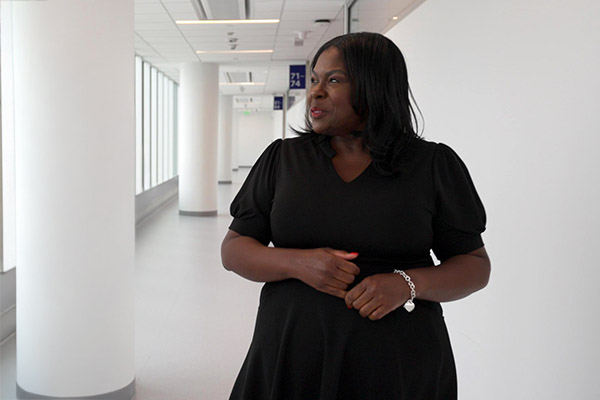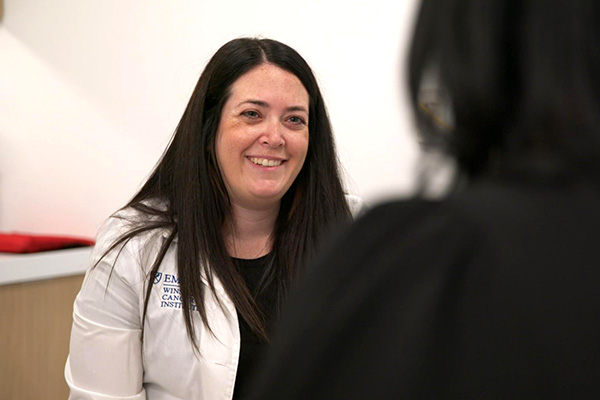Once I actually came in, the experience and compassion were evident from the very beginning.
When a Bit of Irritation Is a Lot More Than It Seems
It started as a bit of irritation on the gum inside her mouth. Trina wasn’t exactly sure what it was. She thought it might have something to do with normal dental hygiene. When it didn’t get better, she went back to her dentist and asked him to take another look. He wound up sending her to a periodontist.
“They did not like what they saw,” says Trina. They decided to do a biopsy and sent off the specimen. “The pathology report came back positive for squamous cell carcinoma,” Trina says.
Trina was familiar with Winship Cancer Institute of Emory University because its name kept coming up with friends and colleagues she asked for recommendations. Even her primary care physician said Winship is where she would go for treatment if she had cancer. “Over and over again,” says Trina, “Winship Cancer Institute came forward as the obvious and best choice.”
Coming to Winship

Trina was already feeling comfortable with her choice to seek treatment at Winship. “Once I actually came in,” she says, “the experience and compassion were evident from the very beginning.” She was impressed by how well she felt listened to and was provided with a comprehensive view of both her diagnosis and the treatment plan. “I felt very comfortable and very sure right after that first visit,” she says.
Her comfort was especially important because she had to have a very detailed two-part procedure called a segmental mandibulectomy. It involved surgically removing the section of jaw where the tumor was, and then reconstructing the jawline. “It was a very detailed process,” Trina says, “and I really appreciated the fact that they were able to articulate the course of treatment well in advance so that, as it was happening, I understood this is supposed to happen, and this is how it actually goes.”
Trina was able to benefit from having access to so many of the services and specialists she needed during her inpatient time. “I had all the providers seeing me around the clock,” she says. “I had inpatient physical therapy when i was able to get to that point. I also saw the nutritionist. I saw the speech therapist prior to my discharge. And of course, I saw the care coordinators to help me with what my needs would be once I was discharged.”
After she was discharged, Trina continued her treatment on an outpatient basis. She was able to get her radiation treatment at the Emory Proton Therapy Center. She continued physical therapy and was connected to a hyperbaric wound care specialist to make sure her wounds healed properly.
“When Winship says comprehensive treatment, they really do mean that,” Trina says.
Why Multidisciplinary Care Matters

“Absolutely amazing” is how Trina describes the level of care and expertise she received at Winship. “It was absolutely incredible to be connected to such a team,” she says.
Trina credits the team’s detailed treatment plan for saving her a lot of time and hassle. “I didn’t have to go around all over the city, seeing one specialist here, another specialist there. It was all these comprehensive services and these multiple disciplines in one place.” She adds, “I was so pleased with the level of expertise of the entire team.”
Sure, there were the advanced, amazing technologies that contributed to her treatment. But what most impressed Trina was her multidisciplinary team’s ability to connect with her as a person. She says, “They made sure that they took their time to communicate, to educate, to assess me holistically and make sure that I would have the best opportunities for a successful outcome.”
The team is made up of a lot of members. The treating physicians typically include surgical oncologists, medical oncologists and radiation oncologists. Because head and neck cancer often affects the mouth, a dental oncologist and oral maxillofacial surgeons are also involved.
The disease can affect speech and swallowing, so speech pathologists are involved to help patients with exercises that strengthen muscles in the neck, jaw and tongue to reduce muscle tension and improve speech and swallowing. There are dietitians helping patients with their diet while undergoing treatment. A team of social workers supports patients who also deal with the psychosocial impact of head and neck cancer, which may include anxiety, distress, depression, body and self-image concerns, pain and changes in sexual function or desire. Behind this care team is a dedicated group of nurses, schedulers, and patient care coordinators, all working together to give patients the best chance of not only surviving their illness but also living well.
Care tailored to your needs
Head and neck cancer care at Winship includes leading cancer specialists collaborating across disciplines to tailor treatment plans to each patient’s needs; innovative therapies and clinical trials; comprehensive patient and family support services; and a care experience aimed at easing the burden of cancer.

